|
Dollar Diplomacy
Dollar diplomacy of the United States, particularly during the presidency of William Howard Taft (1909–1913) was a form of American foreign policy to minimize the use or threat of military force and instead further its aims in Latin America and East Asia through the use of its economic power by guaranteeing loans made to foreign countries. In his message to Congress on 3 December 1912, Taft summarized the policy of Dollar diplomacy: :The diplomacy of the present administration has sought to respond to modern ideas of commercial intercourse. This policy has been characterized as substituting dollars for bullets. It is one that appeals alike to idealistic humanitarian sentiments, to the dictates of sound policy and strategy, and to legitimate commercial aims. Dollar diplomacy was not new, as the use of diplomacy to promote commercial interest dates from the early years of the Republic. However, under Taft, the State Department was more active than ever in encouraging and support ... [...More Info...] [...Related Items...] OR: [Wikipedia] [Google] [Baidu] |
Presidency Of William Howard Taft
The presidency of William Howard Taft began on March 4, 1909, when William Howard Taft was inaugurated as 27th president of the United States, and ended on March 4, 1913. Taft, was a Republican from Ohio. The protégé and chosen successor of President Theodore Roosevelt, he took office after easily defeating Democrat William Jennings Bryan in the 1908 presidential election. His presidency ended with his defeat in the 1912 election by Democrat Woodrow Wilson. Taft sought to lower tariffs--a tax on imports--then a major source of governmental income. However he was out-maneuvered. The new Payne–Aldrich Tariff Act of 1909 raised rates when most people expected reductions. Taft expanded Roosevelt's efforts to break up trusts, launching legal cases against U.S. Steel and other very large companies. Taft made six appointments to the United States Supreme Court, more than all but two other presidents. In foreign affairs, Taft focused on China and Japan, and repeatedly interven ... [...More Info...] [...Related Items...] OR: [Wikipedia] [Google] [Baidu] |
Roosevelt Corollary
In the history of United States foreign policy, the Roosevelt Corollary was an addition to the Monroe Doctrine articulated by President Theodore Roosevelt in his State of the Union address in 1904 after the Venezuelan crisis of 1902–1903. The corollary states that the United States could intervene in the internal affairs of Latin American countries if they committed flagrant and chronic wrongdoings. Roosevelt tied his policy to the Monroe Doctrine, and it was also consistent with his foreign policy included in his Big Stick Diplomacy. Roosevelt stated that in keeping with the Monroe Doctrine, the United States was justified in exercising "international police power" to put an end to chronic unrest or wrongdoing in the Western Hemisphere. President Herbert Hoover in 1930 endorsed the Clark Memorandum that repudiated the Roosevelt Corollary in favor of what was later called the Good Neighbor policy. Background The Roosevelt Corollary was articulated in the aftermath o ... [...More Info...] [...Related Items...] OR: [Wikipedia] [Google] [Baidu] |
History Of U
History (derived ) is the systematic study and the documentation of the human activity. The time period of event before the invention of writing systems is considered prehistory. "History" is an umbrella term comprising past events as well as the memory, discovery, collection, organization, presentation, and interpretation of these events. Historians seek knowledge of the past using historical sources such as written documents, oral accounts, art and material artifacts, and ecological markers. History is not complete and still has debatable mysteries. History is also an academic discipline which uses narrative to describe, examine, question, and analyze past events, and investigate their patterns of cause and effect. Historians often debate which narrative best explains an event, as well as the significance of different causes and effects. Historians also debate the nature of history as an end in itself, as well as its usefulness to give perspective on the problems of the p ... [...More Info...] [...Related Items...] OR: [Wikipedia] [Google] [Baidu] |
American Imperialism
American imperialism refers to the expansion of American political, economic, cultural, and media influence beyond the boundaries of the United States. Depending on the commentator, it may include imperialism through outright military conquest; gunboat diplomacy; unequal treaties; subsidization of preferred factions; regime change; or economic penetration through private companies, potentially followed by diplomatic or forceful intervention when those interests are threatened. The policies perpetuating American imperialism and expansionism are usually considered to have begun with "New Imperialism" in the late 19th century, though some consider American territorial expansion at the expense of Native Americans to be similar enough in nature to be identified with the same term. While the United States has never officially identified itself and its territorial possessions as an empire, some commentators have referred to the country as such, including Max Boot, Arthur M. Schl ... [...More Info...] [...Related Items...] OR: [Wikipedia] [Google] [Baidu] |
Railway Protection Movement
The Railway Protection Movement (), also known as the "Railway Rights Protection Movement", was a political protest movement that erupted in 1911 in late Qing China against the Qing government's plan to nationalize local railway development projects and transfer control to foreign banks. The movement, centered in Sichuan province, expressed mass discontent with Qing rule, galvanized anti-Qing groups and contributed to the outbreak of the Xinhai Revolution. The mobilization of imperial troops from neighboring Hubei Province to suppress the Railway Protection Movement created the opportunity for revolutionaries in Wuhan to launch the Wuchang Uprising, which triggered the revolution that overthrew the Qing dynasty and established the Republic of China. Background From the 1890s to 1905, nearly all railways in China were planned, financed, built and operated by foreign powers pursuant to concessions from the Qing government. To help local economies develop and retain earnings f ... [...More Info...] [...Related Items...] OR: [Wikipedia] [Google] [Baidu] |
China Consortium
The China Consortium, also referred to as banking consortium or financial consortium or four-, five-, or six-power consortium depending on context, refers to two successive cooperative arrangements formed by foreign banks under their respective governments' directions in the early 20th century, to coordinate lending to the Chinese government. These initiatives were resented by Chinese nationalists and later similarly criticized by Chinese Communists, as instruments of colonialism wielded by Western nations and Japan. First China Consortium Background The emergence of the "old" China Consortium in 1909–1910 happened in the context of Qing dynasty China's need for external financing, because of its need to pay war damages under the Treaty of Shimonoseki of 1895 (200 million taels) and Boxer Protocol of 1901 (450 million taels), and with the scramble for railway concessions in the late 19th and early 20th centuries. The context was further framed by the British-French Entente Co ... [...More Info...] [...Related Items...] OR: [Wikipedia] [Google] [Baidu] |
Philander Knox
Philander Chase Knox (May 6, 1853October 12, 1921) was an American lawyer, bank director and politician. A member of the Republican Party, Knox served in the Cabinet of three different presidents and represented Pennsylvania in the United States Senate. Born in Brownsville, Pennsylvania, Knox became a prominent attorney in Pittsburgh, forming the law firm of Knox and Reed. With the industrialists Henry Clay Frick and Andrew Mellon, Knox also served as a director of the Pittsburgh National Bank of Commerce. In early 1901, he accepted appointment as United States Attorney General. Knox served under President William McKinley until McKinley was assassinated in September 1901, and Knox continued to serve under President Theodore Roosevelt until 1904, when he resigned to accept appointment to the Senate. Knox won re-election to the Senate in 1905 and unsuccessfully sought the 1908 Republican presidential nomination. In 1909, President William Howard Taft appointed Knox to the posit ... [...More Info...] [...Related Items...] OR: [Wikipedia] [Google] [Baidu] |
Open Door Policy
The Open Door Policy () is the United States diplomatic policy established in the late 19th and early 20th century that called for a system of equal trade and investment and to guarantee the territorial integrity of Qing China. The policy was enunciated in US Secretary of State John Hay's Open Door Note, dated September 6, 1899 and circulated to the major European powers. In order to prevent them from "carving of China like a melon," as they were doing in Africa, the Note asked the powers to keep China open to trade with all countries on an equal basis and called upon all powers, within their spheres of influence to refrain from interfering with any treaty port or any vested interest, to permit Chinese authorities to collect tariffs on an equal basis, and to show no favors to their own nationals in the matter of harbor dues or railroad charges. The policy was accepted only grudgingly, if at all, by the major powers, and it had no legal standing or enforcement mechanism. In J ... [...More Info...] [...Related Items...] OR: [Wikipedia] [Google] [Baidu] |
Imperial Chinese Government 5 % Hukuang Railways Gold Loan 1911
Imperial is that which relates to an empire, emperor, or imperialism. Imperial or The Imperial may also refer to: Places United States * Imperial, California * Imperial, Missouri * Imperial, Nebraska * Imperial, Pennsylvania * Imperial, Texas * Imperial, West Virginia * Imperial, Virginia * Imperial County, California * Imperial Valley, California * Imperial Beach, California Elsewhere * Imperial (Madrid), an administrative neighborhood in Spain * Imperial, Saskatchewan, a town in Canada Buildings * Imperial Apartments, a building in Brooklyn, New York * Imperial City, Huế, a palace in Huế, Vietnam * Imperial Palace (other) * Imperial Towers, a group of lighthouses on Lake Huron, Canada * The Imperial (Mumbai), a skyscraper apartment complex in India Animals and plants * ''Cheritra'' or imperial, a genus of butterfly Architecture, design, and fashion * Imperial, a luggage case for the top of a coach * Imperial, the top, roof or second-storey compar ... [...More Info...] [...Related Items...] OR: [Wikipedia] [Google] [Baidu] |
Haiti
Haiti (; ht, Ayiti ; French: ), officially the Republic of Haiti (); ) and formerly known as Hayti, is a country located on the island of Hispaniola in the Greater Antilles archipelago of the Caribbean Sea, east of Cuba and Jamaica, and south of The Bahamas and the Turks and Caicos Islands. It occupies the western three-eighths of the island which it shares with the Dominican Republic. To its south-west lies the small Navassa Island, which is claimed by Haiti but is disputed as a United States territory under federal administration."Haiti" ''Encyclopædia Britannica''. Haiti is in size, the third largest country in the by area, and has an estimated population of 11.4 million, making it ... [...More Info...] [...Related Items...] OR: [Wikipedia] [Google] [Baidu] |
Honduras
Honduras, officially the Republic of Honduras, is a country in Central America. The republic of Honduras is bordered to the west by Guatemala, to the southwest by El Salvador, to the southeast by Nicaragua, to the south by the Pacific Ocean at the Gulf of Fonseca, and to the north by the Gulf of Honduras, a large inlet of the Caribbean Sea. Its capital and largest city is Tegucigalpa. Honduras was home to several important Mesoamerican cultures, most notably the Maya, before the Spanish Colonization in the sixteenth century. The Spanish introduced Catholicism and the now predominant Spanish language, along with numerous customs that have blended with the indigenous culture. Honduras became independent in 1821 and has since been a republic, although it has consistently endured much social strife and political instability, and remains one of the poorest countries in the Western Hemisphere. In 1960, the northern part of what was the Mosquito Coast was transferred from ... [...More Info...] [...Related Items...] OR: [Wikipedia] [Google] [Baidu] |


.jpg)


